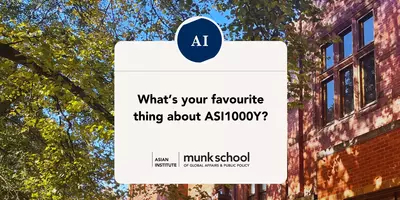CAH390H: Asian Digital Network Practicum
Constantly seeking to enrich student experience, the Asian Institute continues to create numerous pathways to meaningful careers, bridging the gap between the classroom and the professional world.
Building on the major benefits of virtual and hybrid work dynamics, CAH390H: Asian Digital Network Practicum provides students with a semester of experiential learning and with the tools to make the most of their work. By partnering with a Canadian non-governmental organization (NGO) working in Asia, students explore and develop their unique skillsets to address the needs of their partner NGO, broadening their knowledge and honing their professional skills.
Taught by Dr. Dylan Clark, CAS390 emboldens students to apply their accumulated and growing education in Contemporary Asian Studies (CAS) program by collaborating with a Canadian NGO working in Asia.
Working in small teams, students design and implement projects to benefit their partner NGO. In addition to helping their NGO with useful projects, the course seeks to inspire students to consider careers in the not-for-profit sector along with fostering a long-term commitment to community activism.
Workplace skills learned
The course builds strong project management skills through collaboration and self-driven learning. The pace of the work is not determined by the professor but by the student team. Accountability comes from the work itself and the broader consequences of these projects for the partner NGOs.
“This structure presented a unique challenge … it required a shift in mindset and my approach to learning …I had to learn to take initiative in conducting research, working closely with my peers, and meeting the expectations of the NGO. Ultimately, it challenged me to be more self-motivated, resourceful, and adaptable.” - Kristi
The course format means that students are applying their growing academic knowledge of contemporary Asia to a professional project structure. In lieu of essays, students have progress reports; in lieu of tests, students produce creative and timely projects.
“It was a new experience and taught me how to hold myself accountable for my work… We weren’t just working for a good grade but to truly make a difference.” - Natalie
The work is meaningful not only in terms of the educational value it brings to students, but also in that it leads to consequential, pragmatic applications.
Building the foundation for the future
The course encourages students to look beyond the classroom to understand that knowledge and skills are transferable and ever-evolving. Engaging academic knowledge in such a critical and practical manner through the practicum gives students the knowledge and experience that leads to exemplary progress in the professional world.
"Service-learning is an invaluable experience that can help us recognize that our academic careers do not exist in isolation and often directly address real-world situations and a wide range of global issues... This provided me with the valuable opportunity to draw upon academic research skills that I had developed from researching for papers and projects for past classes and utilize them to contribute to the database of an NGO addressing an international human rights concern.” - Kristi
The Asian Institute’s Contemporary Asian Studies program (CAS) provides a lens through which to examine the links between Asia’s history, its increasing influence in world affairs, and the challenges and opportunities arising in this time of rapid transformation.
“All of my CAS courses have this underlying theme of thinking deeply and looking ‘beyond the headline.’ What these courses have taught us to develop as students … is very valuable and made the work of this course very rewarding.” - Hannah
The level of self-driven accountability and critical and creative thinking required for these student-driven projects to succeed is the natural next-step for many in their self-discovery process and in navigating career pathways.
“Personally, the most remarkable thing CAS390 taught me was to ask myself what I wanted professionally and why. Practicing introspection helped me build confidence in myself which has pushed me to become more decisive in what I want professionally. It taught me that I should take my time to explore different career paths to find what fits me the best.” - Natalie
Students explore the dynamics of the professional world, integrating their academic knowledge soft-skills, and technical skills.
“I was in the process of deciding what to do after graduation so I took this course to explore and see what it would be like working with NGOs.” - Hannah
CAS390 boosts confidence, fosters independence, and allows students to gain a broader and deeper understanding of professional work. Students begin envisioning career opportunities available to them after they graduate – all while making a difference in the world through their coursework and engagement with Asia.

